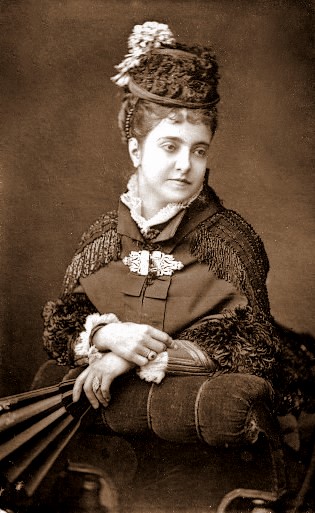By Daniel Hathaway

. Youmans show continues with Wooster matinee, Divas on display at the V&A (pictured: Adelina Patti)
. Almanac remembers Henry VIII, Jean-Jacques Rousseau, Joseph Joachim, Richard Rodgers
HAPPENING TODAY:
2:00 pm – Ohio Light Opera: No, No, Nanette. Book by Otto Harbach and Frank Mandel. Lyrics by Irving Caesar and Otto Harbach. Music by Vincent Youmans. Freedlander Theatre, 329 E. University St., Wooster. Tickets available online.
INTERESTING READ:
New Exhibition at London’s Victoria & Albert Museum
“Exploring the definition of diva-dom is the exhibition DIVA, just opened at the V&A, London. ‘The exhibition will show that there are many definitions and interpretations of a diva,’ lead curator Kate Bailey tells BBC Culture.
“The term “diva,” meaning “goddess” in Latin, was originally associated with leading ladies, the prima donnas of the opera world, as a way to describe their divine talent. Around the time Italian soprano Adelina Patti (1843-1919) became one of the most recognisable faces in the world, the term began to suggest something more. Patti demanded high fees and amassed a fortune rarely enjoyed by a woman, investing much of this in an extravagant lifestyle (donning Parisian couture and setting up residence in a Welsh castle tended by 70 staff, for example), all of which helped sustain public interest, and kept the box office buzzing.
Read From Grace Jones to Madonna — Why Divas Deserve to Be Difficult here.
TODAY’S ALMANAC:
By Jarrett Hoffman
Look past the long series of discarded marriages — more than one ending with a beheading — and you might find interest in the musical side of Henry VIII (born on this date in 1491). BBC Music Magazine explored his impact on the music scene (both harm and help), and his own musical contributions in an article from 2016.
Another historical figure who had a keen interest in music, but who is more famous for his contributions to other disciplines, is Jean-Jacques Rousseau (born on this date in 1712). That writer and philosopher was also a composer, with seven operas to his name, including the one-act Village Soothsayer. Watch a 38-minute video production dating from 1962, featuring the Orchestre de la Suisse Romande, led by Samuel Baud-Bovy.
Rousseau was also a music theorist, developing a system of musical notation that would be compatible with typography: it would use a single line, with numbers expressing different intervals, and periods and commas indicating rhythm. He presented it to the Academie Des Sciences and was rejected, though they seem to have been impressed, and even requested that he have another go at it.
Moving onto names most famous for their music-making, we continue with Hungarian violinist, composer, and conductor Joseph Joachim, born on this date in 1831. One of the great violinists of the 19th century, he was a close collaborator of Brahms, premiering the composer’s Violin Concerto in 1879 with Brahms himself on the podium. Even much earlier, at age 13, his performance of Beethoven’s Violin Concerto (with Felix Mendelssohn conducting) helped bring that work into greater esteem.
In 1903, Joachim became one of the earliest violinists to be recorded: hear him in fuzzy but fascinating renditions of Brahms’ Hungarian Dances Nos. 1 and 2.
And finally, composer Richard Rodgers was born on this date in 1902 in New York City. He’s most famous for his work in musical theater, particularly in collaboration with Lorenz Hart and Oscar Hammerstein II — the latter partnership became the most successful in the history of American musical theater.
And though the “EGOT” was not such a historic concept at the time, Grammy Awards still being in their infancy, Rodgers became the first person to ever receive Emmy, Grammy, Oscar, and Tony Awards. (He also received a Pulitzer — only he and Marvin Hamlisch have ever taken in all five awards.)
The Sound of Music — the last musical by Rodgers and Hammerstein together — not only won five Tonys, but its film version won five Oscars. Watch a clip from the movie, where Julie Andrews memorably sings the title track.



